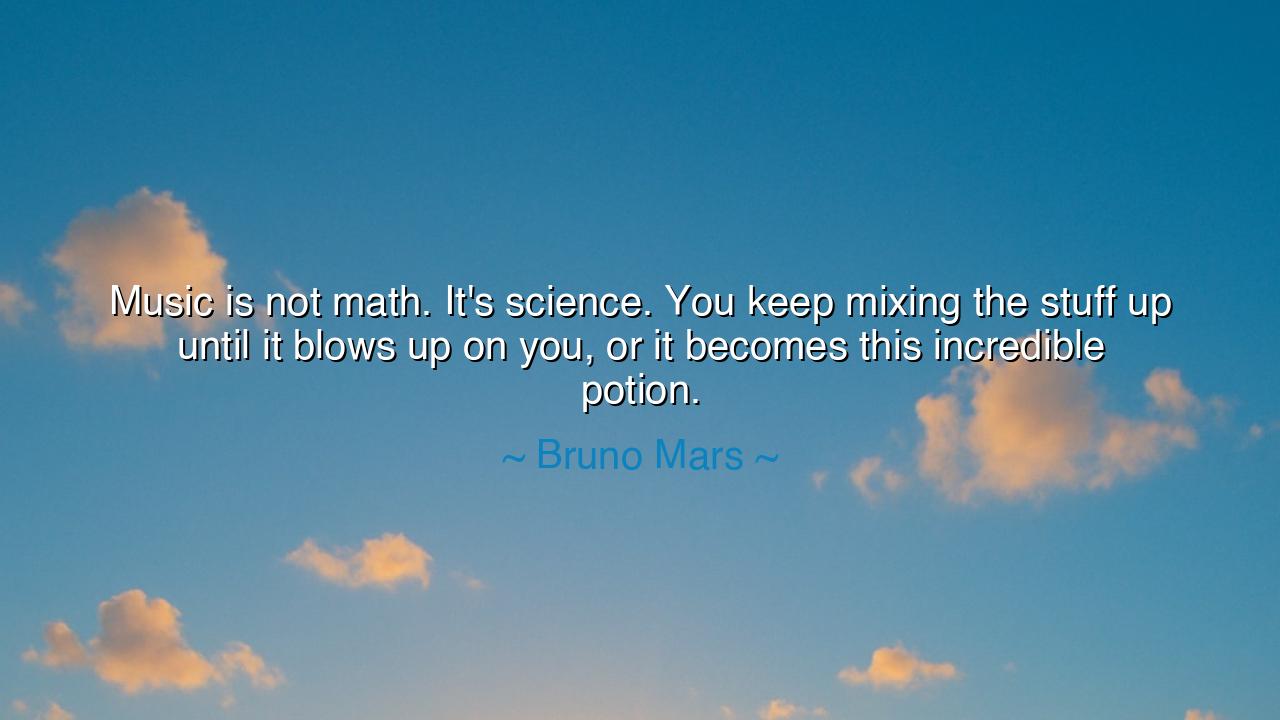
Music is not math. It's science. You keep mixing the stuff up
Music is not math. It's science. You keep mixing the stuff up until it blows up on you, or it becomes this incredible potion.






"Music is not math. It's science. You keep mixing the stuff up until it blows up on you, or it becomes this incredible potion." These words spoken by Bruno Mars unveil a deeper truth about the essence of creativity and the art of music. They remind us that, much like in alchemy, the process of creation is both unpredictable and mysterious—a mixture of elements that can either explode in chaos or result in something magnificent. Music, in its purest form, is not merely a set of rigid calculations or formulas to be followed. It is a dynamic and ever-evolving science—a craft that requires both intuition and experimentation. This is the magic of music: its ability to take us to the unknown, to create something extraordinary out of the most basic ingredients.
In the ancient world, the pursuit of knowledge was seen as a blend of reason and mysticism. Think of Pythagoras, who found in music the marriage of mathematics and harmony. His discovery of the relationship between musical intervals and the ratios of strings on a lyre laid the foundation for what would later become the field of acoustics. But even Pythagoras, in his deep understanding of the laws of the universe, would have recognized that music’s true power lies not in the calculation of numbers alone but in its ability to stir the soul, to bring together science and spirit. Music, as Mars suggests, is not confined to the logic of math, but thrives in the unpredictable realm of science—a field where the blending of elements often leads to the most unexpected and beautiful results.
Consider the great composer Ludwig van Beethoven, whose works transcended the boundaries of the classical form. Though his music adhered to certain rules of structure and harmony, Beethoven did not simply follow a set of formulas. He experimented, often pushing the boundaries of what was possible with sound, and created compositions that were revolutionary in their depth and emotion. His symphonies were not merely the result of mathematical precision but were forged through a process of trial and error, a synthesis of sound and emotion. Much like Mars’s metaphor of mixing ingredients, Beethoven's music was a potion, a mixture of elements that sometimes blew up in wild dissonance, but when everything came together, it created something transcendent.
In our own time, we see this same process of musical alchemy in the work of artists like Bruno Mars, who constantly mixes styles, genres, and sounds to create songs that are both innovative and timeless. His work is a testament to the unpredictable nature of musical creation, where the magic happens when seemingly disparate elements are thrown together and crafted into something entirely new. It is not a simple equation, but a dynamic process of experimentation, discovery, and mastery. Mars’s music, like the work of many great musicians, is a living experiment, one that takes risks and pushes the boundaries of what is possible in the world of sound. It’s through this process of mixing, testing, and refining that musical magic is made.
Yet, just as in alchemy, the process of musical creation is fraught with danger. Sometimes, when the mixture does not come together, the results are less than perfect—an idea that remains unfinished or a melody that fails to resonate. But the beauty of music, much like the pursuit of scientific discovery, lies in the willingness to experiment, to fail, and to try again. The act of creating something from nothing—be it a song, a symphony, or a simple melody—is a deeply human act, one that speaks to our eternal desire to express, to connect, and to create. It is this process of trial and error that brings about the potion—the harmony, the rhythm, the melody that moves the soul.
Thus, the lesson from Mars’s words is not just about the art of music, but about the spirit of creation itself. Whether in music, science, or any other field, the act of creation requires a willingness to take risks, to mix the known with the unknown, to combine the science of our skills with the alchemy of our imagination. It teaches us that perfection is not always the goal; the journey of discovery, the willingness to mix and experiment, is what leads to the true beauty of creation. Just as a potion can explode or become a masterpiece, so too can our ideas, our projects, and our dreams be shaped by the forces of trial, failure, and eventual success.
In our own lives, we must embrace this process of mixing—of taking the elements of our talents, experiences, and passions and seeing where they take us. We must not fear the explosion that may occur when things do not go as planned, for even in failure, there is learning, and from that learning comes the opportunity to create something new and magnificent. Like the ancient alchemists, let us not be afraid to mix the known and the unknown, the science and the art, in the quest to discover the extraordinary. For it is through this blending, this experimentation, that we find the true magic of creation.






AAdministratorAdministrator
Welcome, honored guests. Please leave a comment, we will respond soon